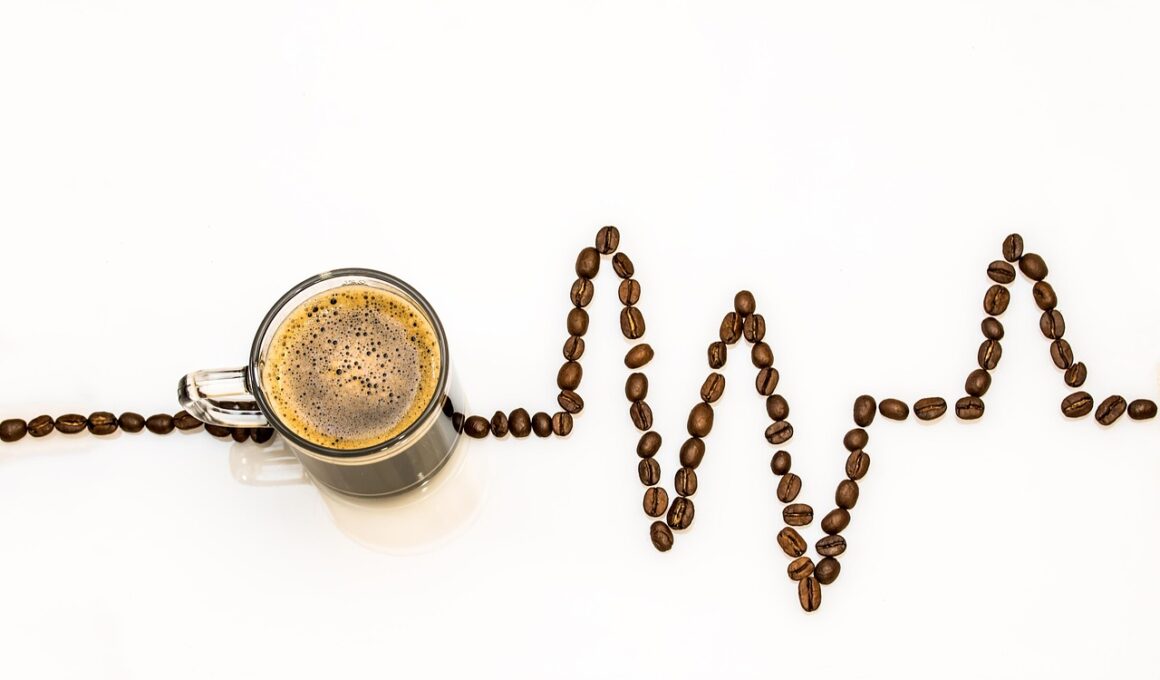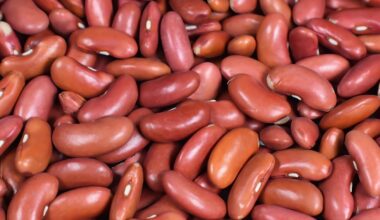Managing Caffeine Intake Before Your HIIT Session
High-Intensity Interval Training (HIIT) presents an exceptional opportunity to enhance physical fitness due to its intense bursts of activity interspersed with rest. For athletes engaging in HIIT, pre-workout nutrition emerges as a critical factor influencing performance and recovery. This is particularly true for caffeine, a widely utilized stimulant. Research indicates that caffeine can significantly boost energy levels, focus, and stamina, making it a popular choice among athletes. However, timing and dosage matter tremendously. Consuming caffeine too late or too early may result in fatigue or jitteriness, which could detract from HIIT effectiveness. Another consideration is an individual’s tolerance to caffeine; while some feel its stimulating effects almost immediately, others require larger doses. Thus, understanding personal factors, hydration levels, and the specific demands of one’s workout can enhance the outcomes of caffeine consumption. In this article, we’ll explore the optimal strategies for integrating caffeine as part of HIIT preparation to maximize workout results without negatively impacting health or performance. It’s essential to remember that while caffeine offers benefits, it must be carefully managed to avoid potential downsides.
Understanding Caffeine’s Role
Caffeine stimulates the central nervous system, helping improve alertness and mental clarity. When preparing for a HIIT workout, employing caffeine can provide several advantages that can enhance performance. Products containing caffeine, such as coffee or sports supplements, have become increasingly prevalent among athletes aiming for peak performance. Notably, caffeine aids in the breakdown of fat, promoting enhanced endurance during the workout. Furthermore, caffeine may reduce the perception of effort and fatigue during strenuous activities, enabling the athlete to push their limits. Consuming caffeine at the right time before the HIIT session ensures optimal energy supply at crucial moments, allowing athletes to capitalize on its performance-enhancing effects. However, studies indicate that individual responses can vary dramatically, with some experiencing increased heart rate or anxiety. Therefore, it’s pivotal to experiment with different timings and quantities of caffeine intake. Recognizing one’s unique response to caffeine can greatly influence the effectiveness of a HIIT workout and should not be overlooked. As caffeine’s effects can last several hours, understanding personal limits can contribute positively to overall workout experience and recovery.
The timing of caffeine consumption in relation to a HIIT session is paramount for maximizing its benefits. Recent studies suggest that consuming caffeine approximately 30 to 60 minutes before exercise can yield the best results. At this time, the body’s peak caffeine levels coincide with the workout’s high-intensity intervals. This timing allows for elevated energy levels when most needed, helping sustain performance throughout the challenging parts of the training. However, it’s crucial to note that each individual’s body metabolizes caffeine differently, leading to variations in peak performance timing. Therefore, personal experimentation becomes important for finding the perfect pre-workout caffeine window. Athletes are encouraged to test their caffeine intake timing on non-competition days to refine their approach, allowing for the adjustment of dosages or intervals as necessary. Staying appropriately hydrated prior to consuming caffeine is vital as well, as dehydration can exacerbate the jittery effects that caffeine may produce. This section highlights how understanding caffeine’s timing can play a pivotal role in optimizing the benefits derived from its consumption. Efficient pre-workout caffeine strategies can profoundly enhance overall workout quality.
Dosage Considerations
Determining the right dosage of caffeine before a HIIT session is essential for improving performance while minimizing adverse effects. While guidelines suggest a caffeine dose of approximately 3 to 6 mg per kilogram of body weight is effective for enhancing athletic performance, individual responses can vary. For instance, some athletes may find that even a small dose provides significant benefits, while others might need to consume closer to the upper limit to experience noticeable effects. It is wise to start with a lower dosage and gradually increase it as tolerance develops. Additionally, the source of caffeine—in whether through coffee, energy drinks, or supplements—can profoundly influence how one experiences its effects. Those utilizing caffeinated gels or chews might find they have a fast-acting, concentrated effect. Athletes should also consider the timing of their caffeine intake, as quick-acting sources may have immediate effects while slower sources might provide longer-lasting energy. Careful attention to caffeine dosage enables athletes to balance performance enhancement without negative side effects such as nervousness, restlessness, or digestive issues that some might encounter.
While caffeine provides numerous benefits for HIIT performance, it is crucial to recognize potential side effects. Overconsumption can lead to jitteriness, increased heart rate, and anxiety, which can hinder workout effectiveness. It’s essential to monitor one’s response to caffeine ingestion, as excessive intake can result in diminishing returns. Common side effects may detract significantly from performance, especially in a high-intensity workout setting where focus and energy are paramount. Also, dehydration is a legitimate concern, given that caffeine may have diuretic properties. Therefore, athletes must prioritize hydration as a significant factor when integrating caffeine into their pre-workout routine. Another concern is dependence; chronic heavy usage can lead to tolerance or withdrawal symptoms, significantly impacting workouts when caffeine levels fluctuate. To mitigate these risks, athletes might implement caffeine cycling—alternating between periods of high and low intake to maintain its efficacy. Being informed about these issues provides a balanced perspective on caffeine as a performance enhancer and helps athletes make informed choices that are beneficial for their training and health.
Complementing Nutrition
Furthermore, the integration of caffeine should be viewed in conjunction with a well-rounded pre-workout nutrition strategy. Consuming a balanced meal containing carbohydrates, proteins, and healthy fats a few hours before a HIIT session can amplify caffeine’s effects and overall performance. For example, carbohydrates provide an immediate source of energy, supporting high-intensity bursts of effort characteristic in HIIT programs. Proteins assist in muscle recovery, helping to prepare the body for strenuous activities. Focusing solely on caffeine without appropriate nutritional support may lead to insufficient fuel during high-intensity efforts, producing fatigue despite its stimulant properties. Athletes should also experiment with their pre-workout meals to discover what foods best complement their caffeine intake and personal preferences. A seamless combination of caffeine and nutritious food enables robust and sustained energy levels, which are critical for optimal performance. Athletes often find that monitoring their hydration and snack choices plays a vital role in their workout results. Ultimately, a thoughtful approach to pre-workout nutrition can support improved energy, stamina, and recovery in HIIT training.
In conclusion, managing caffeine intake before HIIT sessions can significantly enhance athletic performance when approached correctly. Athletes should monitor their individual responses and adjust timing, dosages, and sources of caffeine accordingly. Timing is critical in optimizing its energizing effects for high-intensity workouts, with the best consumption window typically occurring 30 to 60 minutes prior to exercising. Appropriately dosing caffeine and being mindful of potential side effects can help mitigate undesirable consequences while experiencing its positive attributes. Balancing pre-workout nutrition with caffeine intake further extends its benefits, ensuring athletes have sufficient energy and nutrients to meet the demands of HIIT. Experimentation remains key in discovering what works best for each individual, fostering not only better performance results but also overall health and well-being. Athletes should remain adaptable, prioritizing hydration and their body’s responses to achieve targeted goals. Finally, an informed and careful approach to caffeine can yield enhanced performance outcomes during HIIT workouts, ultimately providing a valuable tool in the athletic arsenal.
For practical references and recipes of what foods work well with caffeine, feel free to explore reputable sports nutrition websites and consult with sports nutritionists. Empowering oneself with knowledge regarding nutrition can greatly enhance an athlete’s performance. The various impacts of caffeine must not overshadow the significance of a comprehensive approach, integrating all elements of training into one effective program. Always remember to evaluate individual reactions and adapt as necessary for future HIIT sessions, ensuring a satisfying and effective workout. Because of the distinctive characteristics of high-intensity training, a personalized approach to pre-workout nutrition becomes immensely beneficial. Gaining an understanding of how caffeine interplays with various food sources and nutritional strategies can foster improved energy levels during training sessions. Remaining mindful of hydration, nutrition, and caffeine intake leads to superior performance and faster recovery periods. Maintaining balance and consistency in training and nutrition practices stands as the key to sustained progress in an athlete’s fitness journey.


